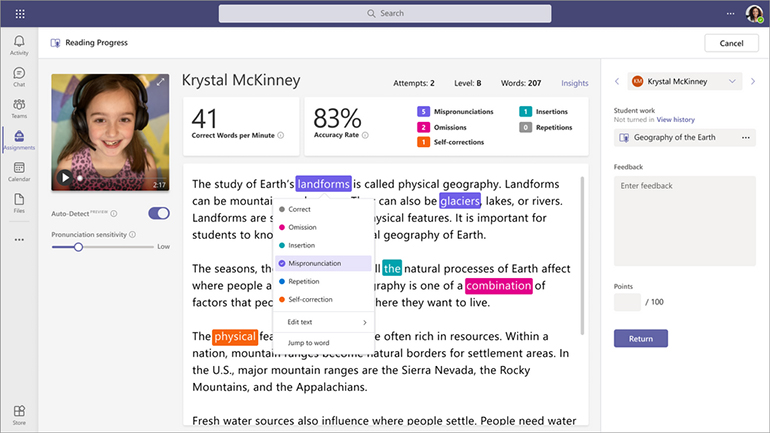The Reading Progress tool in Microsoft Teams is rolling out globally.
Image: Microsoft
Microsoft has rolled out Reading Progress, a free education tool for Teams that gives teachers artificial intelligence (AI) estimations of student performance and errors when reading text.
The Teams app aims to help teachers quickly assess students’ fluency at reading through video and audio recordings. It could be a handy online tool for teachers delivering remote education for the first time, as well as for those who provided remote learning before the pandemic.
The app lets teachers upload a single reading fluency passage for the whole class, or provide different passages to suit students at various reading levels. Students record what they read and send it to their teacher for review.
The Reading Progress app is built into Microsoft Teams Assignments and is available on the Teams app on Windows, Mac, web, iOS and Android platforms.
Microsoft began rolling it out globally on 24 August, but notes in a blogpost that it could take two weeks for it to become available in all regions.
The app illustrates one way that tech has been adapted to meet the needs of remote learning. It may also pave the way to scale up education — a small silver lining for many students whose education was stalled for months and will likely have long-term impacts on learning levels after a year of missed classes.
“This year, educators face the additional challenge of building a supportive and rigorous school experience for students who are entering the classroom without some of the skills they would have developed in a normal year,” says Mike Tholfsen, a principal group product manager at Microsoft Education.
A study from Stanford published in March showed that oral reading fluency growth held steady at the outset of pandemic-driven lockdowns in March, but dropped about 30% behind the expected level by spring.
Beyond remote education, the tool could provide a more efficient way to scale up education, according to Microsoft.
“Traditionally, tracking students’ fluency is irregular and time-consuming because it requires one on one close listening, while somehow still managing the remainder of the class. Creating recordings allows educators to check students’ progress more regularly while also freeing up time for active instruction,” notes Tholfsen.
Microsoft thinks the app could be useful for people who find reading challenging, for middle and high school fluency checks, for special education and dyslexia support, and for building English skills for non-native speakers.
There may be additional benefits for students who don’t, in an isolated environment, feel peer pressure when reading out aloud.
Teachers can use the auto-detect feature, which relies on Microsoft’s AI models to do a quick review of student recordings. Even without using it, data collected from recordings are fed into the Teams Education Insights dashboard to show trends in accuracy rates and correct words per minute, while highlighting difficult vocabulary, mispronunciations, dropped words and inserted words.
Details about the Reading Progress app are available on Microsoft’s landing page for the tool.
The app was launched in a private preview in May and has since gained several new features, including:
PDF upload – Educators can upload and convert a PDF passage into a Reading Progress assignment.Improved Assignment creation layout – we’ve expanded and simplified the area where educators upload and modify the student reading passage.Reading Passage preview and edit text – educators can now modify the uploaded passages before assigning. Support for over 100 languages – Reading Progress is now localized in over 100 languages, and all of the same languages that Teams is supported in. Educators can also upload documents in over 100 languages.Expanded Auto-detect language support – Auto-detect for speech is now supported in 37 languages and locales. Note that these languages are in “preview”, which means we are still improving accuracy and adding additional languages. Additional languages can be uploaded and marked manually. View the full language list.Student View – Educators can view the student experience while creating an assignment.Edit Text during grading and review – educators and manually add student insertions during review.Coming soon – ReadWorks sample content, reading passage support for OneNote pages, Teams Files and Channels.



